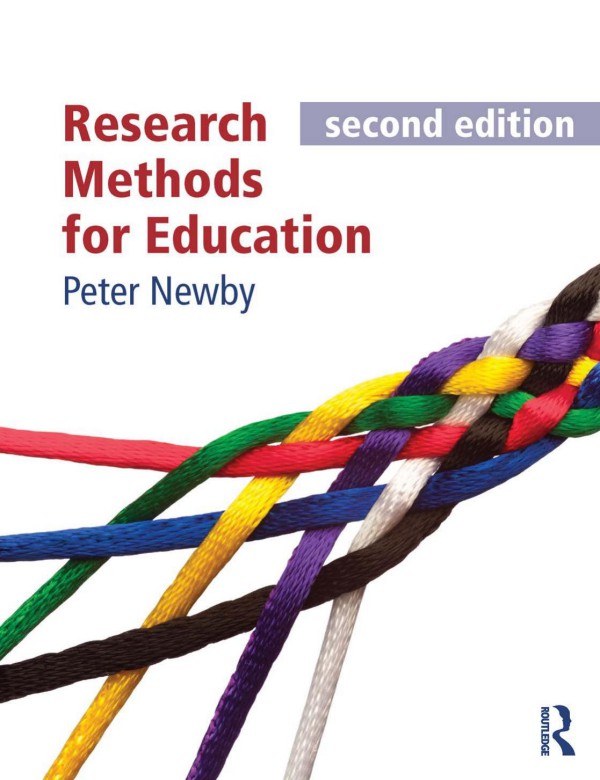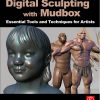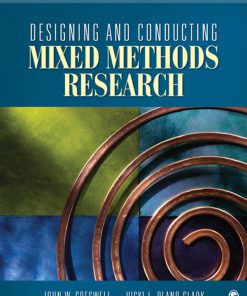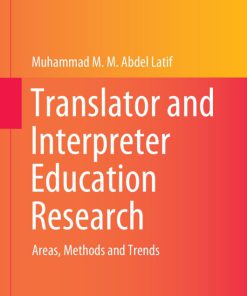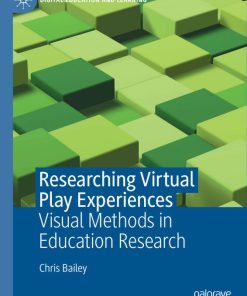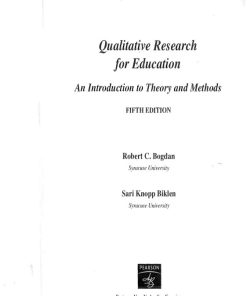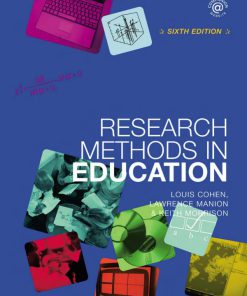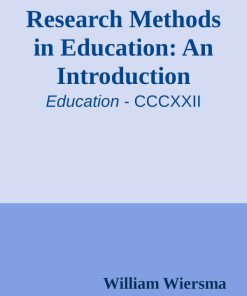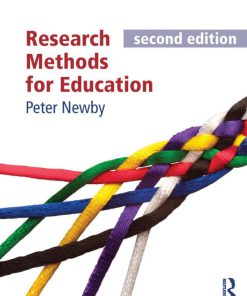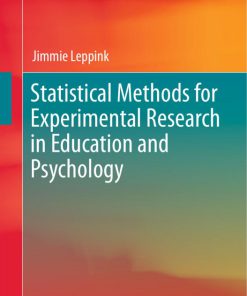(Ebook PDF) Research Methods for Education 2nd Edition by Peter Newby 0415735858 9780415735858 full chapters
$50.00 Original price was: $50.00.$25.00Current price is: $25.00.
Authors:Newby, Peter , Series:Education [277] , Author sort:Newby, Peter , Languages:Languages:eng , Published:Published:Jul 2014 , Publisher:Rouledge
Research Methods for Education 2nd Edition by Peter Newby – Ebook PDF Instant Download/DeliveryISBN: 0415735858, 9780415735858
Full download Research Methods for Education 2nd Edition after payment.
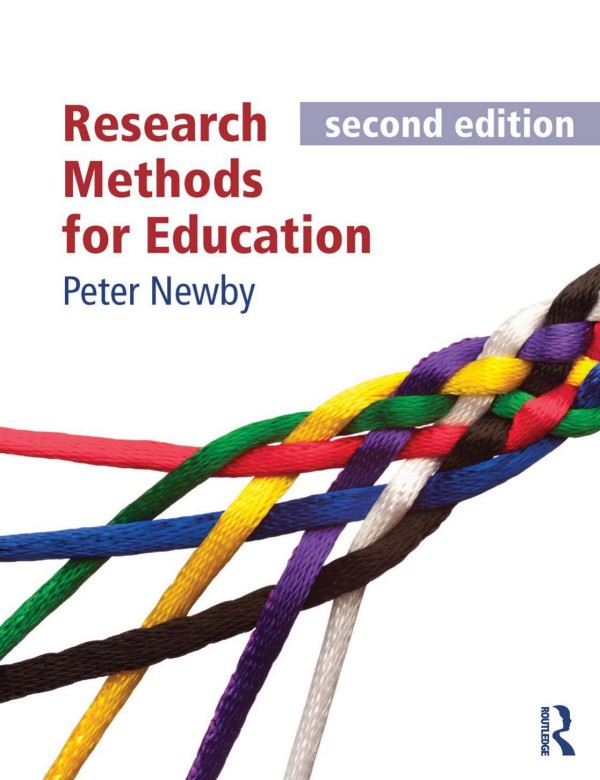
Product details:
ISBN-10 : 0415735858
ISBN-13 : 9780415735858
Author : Peter Newby
Research Methods for Education, Second Edition takes the student by the hand and guides them through the complex subject of research methods in an engaging, witty and clear way. The book covers the philosophical approaches and epistemology, as well as the practical aspects of research, such as designing questionnaires and presenting conclusions. Each chapter is split into ‘Context’ and ‘Practice’ and both sections are packed with exercises, examples and comparative international material from other educational contexts, Peter Newby’s book is the student-friendly text which demystifies the research process with clarity and verve. Key features: -written in a clear and friendly manner to help students feel more confident dealing with the complexities of research and particularly useful for those new to research or less confident with numbers -a mixed methods approach, which doesn’t simply prioritise quantitative or qualitative methods, allowing for greatest possible coverage contains guidance on analytic procedures that require more advanced tools such as SPSS and Minitab -many excellent international examples and case studies specifically from education, which breaks away from a parochial focus on UK education system.
Research Methods for Education 2nd Table of contents:
Part 1 The Context for Your Research
Chapter 1 Research: A messy business
Learning themes
Introduction
1.1 What do you put first?
1.2 Who is this text for?
1.3 Why do we do educational research?
1.4 Who are the educational researchers?
1.5 What are the objectives of educational research?
1.6 Some guidelines on research
1.7 Finally, some things we ought to know about educational research before we start
1.8 Is research a messy business?
Summary
Further reading
References
Chapter 2 Understanding the research process
Learning themes
Introduction
Part A: Context for research
2.1 The influence of ideas and values
2.2 Context: Ideas that influence your goals and outcomes
Part B: Research practice
2.3 Selecting a research issue
2.4 First stages in preparing a research proposal
Summary
Further reading
References
Chapter 3 Putting your research design together
Learning themes
Introduction
Part A: Context for research
3.1 An overview of research approaches
Part B: Research practice
3.2 Research styles
3.3 Outlining your research strategy
Summary
Further reading
References
Part 2 The Process of Data Collection
Chapter 4 Data: Assembling the research toolkit
Learning themes
Introduction
Part A: Context for research
4.1 The character of data
4.2 Primary and secondary data
Part B: Research practice
4.3 Secondary data sources
Summary
Further reading
References
Chapter 5 Using literature in research
Learning themes
Introduction
Part A: Context for research
5.1 The use and misuse of other people’s research
Part B: Research practice
5.2 Strategies for literature search
5.3 Preparing a literature review
Summary
Further reading
References
Chapter 6 Getting the right information
Learning themes
Introduction
Part A: Context for research
6.1 From data to information
6.2 Research planning
6.3 Sampling – being able to say something sensible
Part B: Research practice
6.4 Sampling procedure
6.5 How should we choose which sampling method to use?
6.6 How large should a sample be?
6.7 What can go wrong with a sample?
Summary
Further reading
References
Chapter 7 Cracking the research question
Learning themes
Introduction
Part A: Context for research
7.1 How to construct a route to data
Part B: Research practice
7.2 Getting good data
7.3 Taking stock and preparing for the next step
Summary
Further reading
References
Chapter 8 Asking questions
Learning themes
Introduction
Part A: Context for research
8.1 Elements of a questionnaire
Part B: Research practice
8.2 Developing a questionnaire
8.3 Methods of scaling
8.4 The structure and layout of questionnaires
8.5 Administering the questionnaire
8.6 Piloting the questionnaire
8.7 And finally
Summary
Further reading
References
Chapter 9 Talking, listening and watching: other approaches to data collection
Learning themes
Introduction
Part A: Context for research
9.1 Talking and listening: the context for individual and group interviews
9.2 Watching and listening: the context for observation as a data collection method
Part B: Research practice
9.3 Interviewing in practice
9.4 The practice of observation
Summary
Further reading
References
Part 3 The Process of Data Analysis
Chapter 10 Extracting the information from statistical data
Learning themes
Introduction
Part A: Context for research
10.1 Making numbers talk
Part B: Research practice
10.2 Reading a data set
10.3 Portraying data
Summary
Further reading
References
Chapter 11 Extracting the information from qualitative data sets
Learning themes
Introduction
Part A: Context for research
11.1 Qualitative research: a complex field
Part B: Research practice
11.2 A federation of research practices
11.3 An introduction to qualitative approaches to data analysis
Summary
Further reading
References
Chapter 12 Extracting information from quantitative data
Learning themes
Introduction
Part A: Context for research
12.1 The context for describing by number
Part B: Research practice
12.2 In practice: describing with numbers
Finally: thinking about data description
Summary
Further reading
References
Chapter 13 Using statistics to say something significant
Learning themes
Introduction
Part A: Context for research
13.1 The context for statistical testing
Part B: Research practice
13.2 The practice of testing
13.3 The practice of testing for difference
13.4 The practice of testing relationships
Summary
Further reading
References
Chapter 14 Putting it all together
Learning themes
Introduction
Part A: Context for research
14.1 Pointers to a research strategy
Part B: Research practice
14.2 Styles of research
14.3 Preparing a case for a research programme
14.4 Benefiting from education research
People also search for Research Methods for Education 2nd:
peter newby research methods for education
qualitative research methods for education
research methods for educational leaders
research methods for education newby
research methods for education privitera

